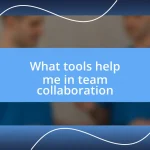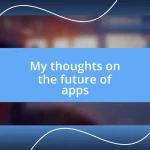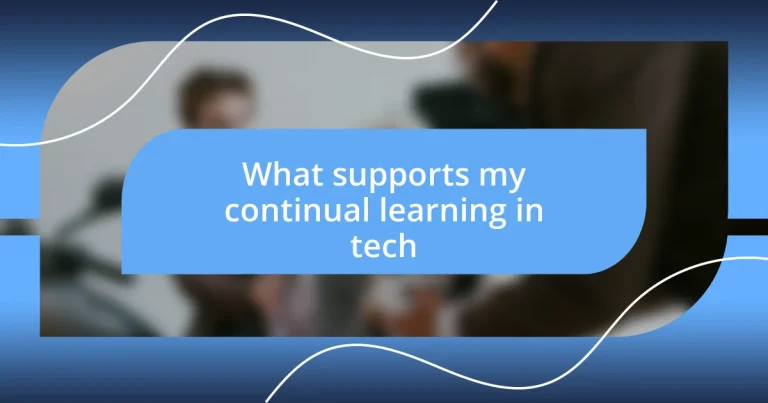Key takeaways:
- Continual learning fosters a growth mindset, opens unexpected opportunities, and boosts confidence in tackling new challenges.
- Identifying individual learning styles and leveraging diverse resources, such as videos and hands-on projects, enhances understanding and retention.
- Setting realistic goals, regularly evaluating progress, and seeking feedback from peers are crucial for sustained growth and adaptability in the tech landscape.
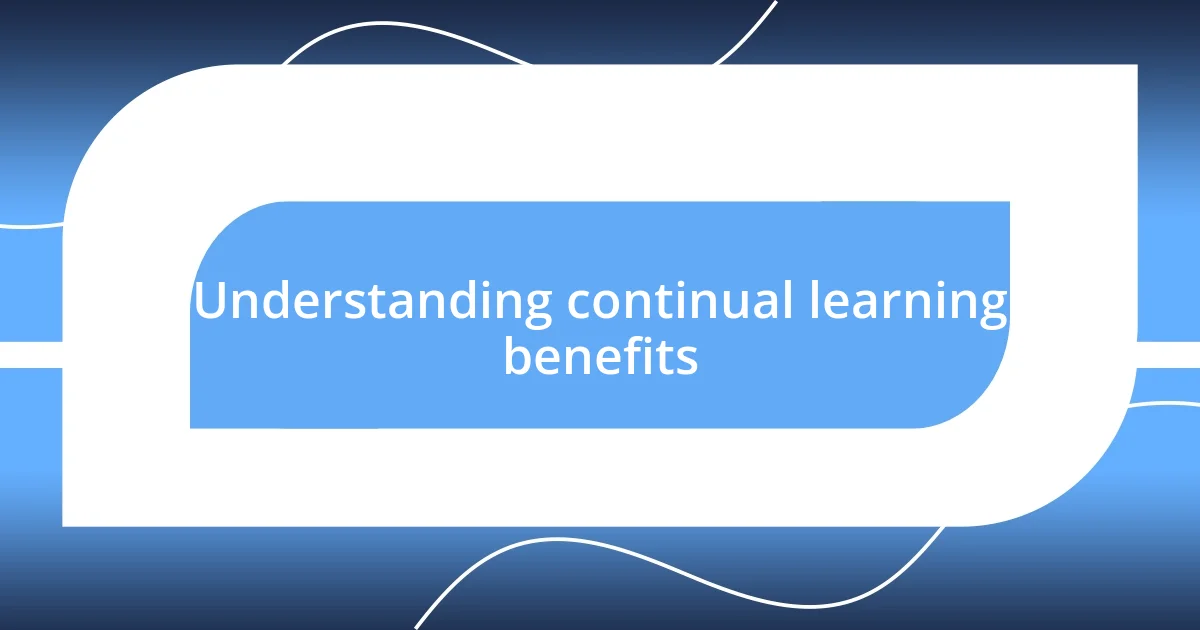
Understanding continual learning benefits
Continual learning in tech isn’t just beneficial; it’s transformative. I remember a time when I felt overwhelmed by the rapid pace of change in the industry. It was through embracing continual learning that I discovered not only new skills but a renewed sense of confidence. Isn’t it fascinating how learning something new can reignite your passion and keep you excited about your work?
One striking benefit I’ve witnessed is how continual learning opens doors to unexpected opportunities. For instance, after I took a course on AI, I found myself in conversations I never anticipated, leading to collaborations that changed my career trajectory. This experience has shown me that every piece of knowledge equips us for future endeavors. What new doors could learning unlock for you?
Moreover, engaging in continual learning fosters a growth mindset, which is essential in the ever-evolving tech landscape. I often reflect on challenges that once felt insurmountable, only to realize that every attempt to learn and adapt prepared me for future obstacles. Have you ever felt the same? It’s a powerful realization that with every step of learning, we equip ourselves to tackle the next big challenge that comes our way.
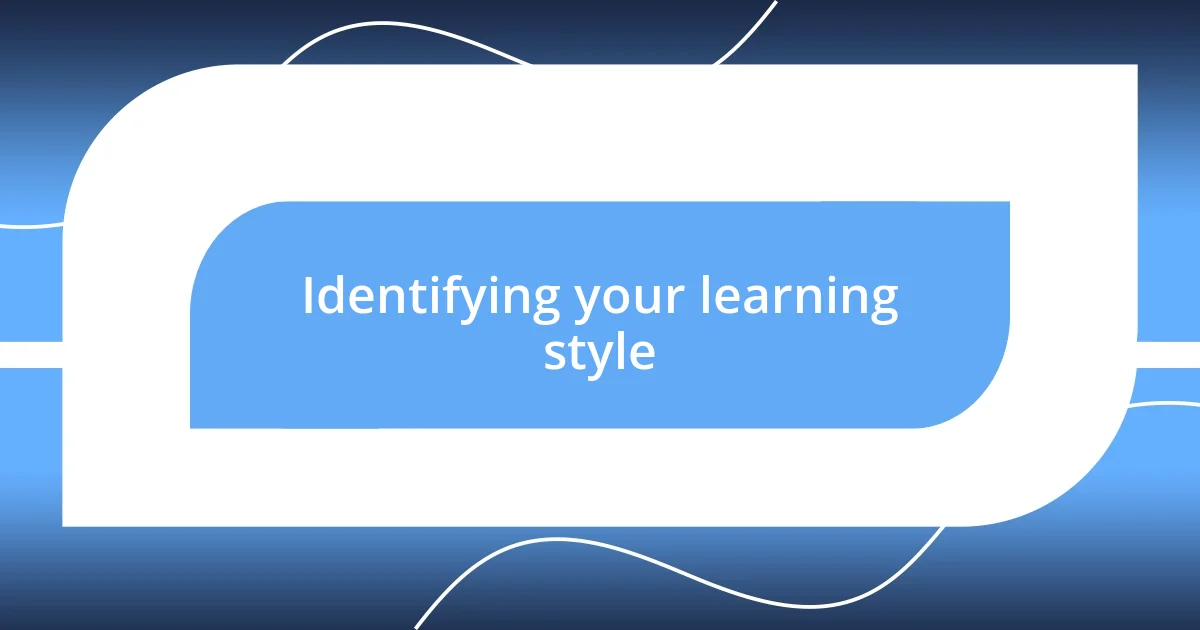
Identifying your learning style
Identifying your learning style is crucial in making your tech education effective and enjoyable. I remember sitting in a workshop where we were asked to fill out a simple questionnaire about how we learn best. It was such an eye-opener! I discovered that I thrive with hands-on experiences rather than just theoretical lectures. Understanding whether you’re a visual, auditory, or kinesthetic learner can transform how you absorb information.
To help you pinpoint your own learning style, consider the following indicators:
- Visual Learners: Do you prefer diagrams, charts, and videos? You likely learn best through visual cues.
- Auditory Learners: Do you find yourself remembering things better after discussing them with others or listening to podcasts? This could indicate an auditory learning preference.
- Kinesthetic Learners: Do you learn best by doing, experimenting, or practicing? If so, hands-on activities may be your ideal way to learn.
Recognizing these preferences can guide you in selecting resources that resonate with you personally. Remember, the goal is to make learning a natural and enjoyable process!
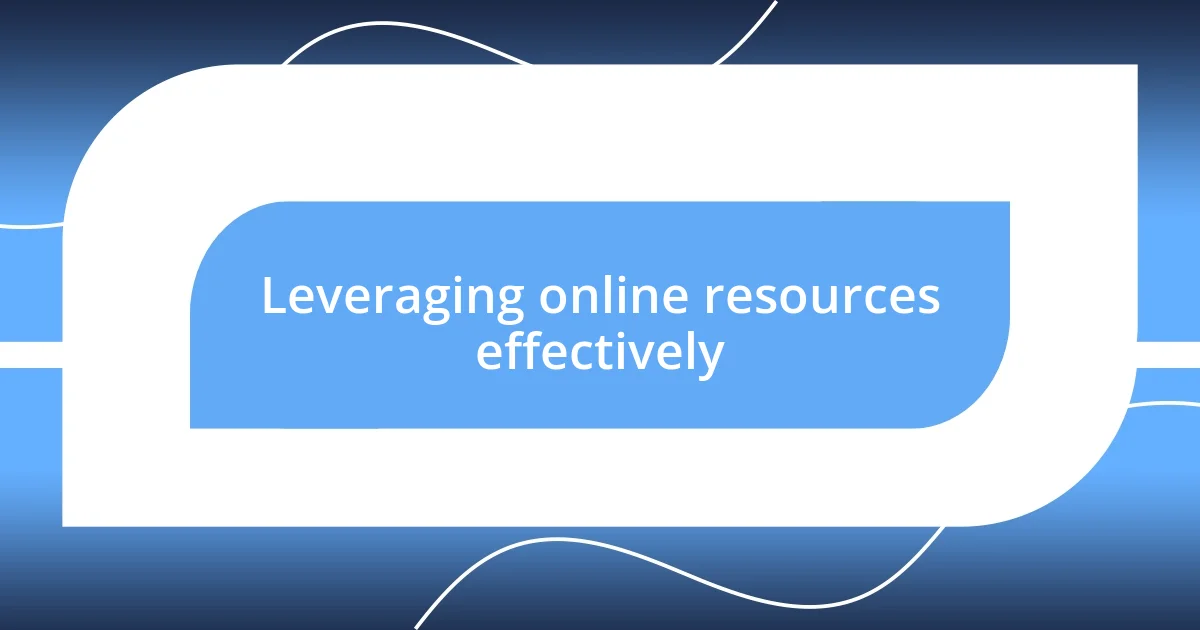
Leveraging online resources effectively
Leveraging online resources effectively can dramatically enhance your continual learning in tech. I often find myself hopping from one online platform to another, each offering a different angle on the same concept. For example, after I struggled with a complex coding problem, a YouTube tutorial not only clarified my doubts but also reignited my enthusiasm for programming. Have you ever discovered that a simple video can turn confusion into clarity?
Additionally, mixing various types of resources can create a richer learning experience. I like to complement my video tutorials with articles and interactive coding exercises. This blend keeps my learning dynamic and reinforces my understanding. Imagine combining the theoretical knowledge from a blog with the practical application of coding challenges—it’s like equipping yourself with tools that make solving problems feel second nature.
| Resource Type | Benefits |
|---|---|
| Video Tutorials | Visually engaging; often breaks down complex subjects into digestible pieces. |
| Articles & Blogs | In-depth analysis and explanations; great for quick reference or deep dives. |
| Interactive Courses | Hands-on experience that reinforces concepts through practice and feedback. |
| Discussion Forums | Community support; sharing struggles and solutions often leads to breakthroughs. |
When I look for online resources, I always consider the credibility of the source. I remember following a popular blog only to find out later that some of the information was outdated. Now, I opt for platforms that offer peer-reviewed content or those endorsed by industry experts. This way, I feel confident knowing that I am absorbing accurate and relevant knowledge.
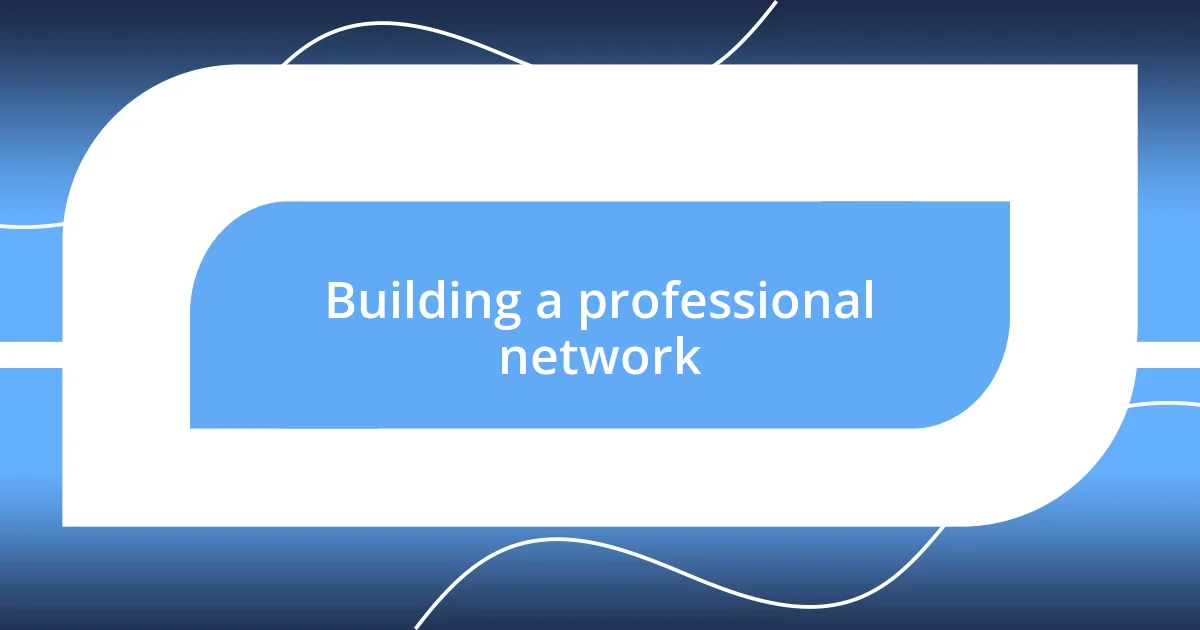
Building a professional network
Building a professional network has been instrumental in my continual learning journey in tech. I vividly recall attending a local meetup where I met people who were not only passionate about technology but also willing to share their experiences. This wasn’t just networking; it felt like entering a community where everyone was eager to help each other grow. Have you ever experienced that warmth from connecting with others in your field?
The connections I’ve made have opened doors to opportunities and insights I never would have encountered on my own. I remember a pivotal moment when a friend from one of these meetups introduced me to a mentor in my desired area of expertise. Our conversations were filled with insights and constructive feedback, fueling my growth in ways I hadn’t anticipated. It’s fascinating how a single introduction can lead to an avalanche of knowledge and inspiration.
Networking isn’t solely about advancing your career; it’s about finding a supportive environment that fosters learning. I often reach out to fellow tech enthusiasts to collaborate on projects or discuss industry trends. These exchanges not only broaden my perspective but also serve as a reminder that we are all navigating similar challenges in this ever-evolving landscape. Have you considered how your network might hold the key to unlocking your next great learning experience?
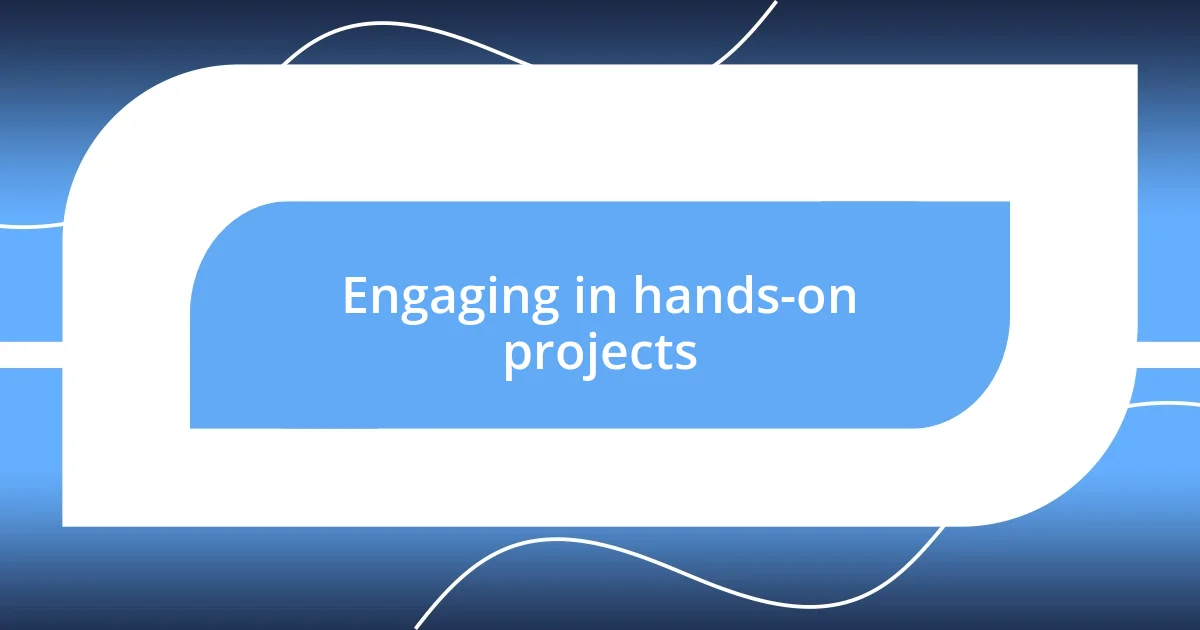
Engaging in hands-on projects
Engaging in hands-on projects has been a game-changer for me in the tech world. I remember diving headfirst into an open-source project one summer. At first, the code felt like a foreign language, but as I started to contribute, something clicked. Have you ever taken on a challenge that seemed daunting, only to find it rewarding once you pushed through? That experience taught me the real-world application of skills I had only read about before.
There’s something uniquely rewarding about building something from scratch. I often find that when I create a small application or tool to solve a personal problem, it reinforces my understanding in ways that textbooks can’t. For instance, making a budgeting app tailored for my own needs pushed me to learn about databases and user interfaces. Each feature I added wasn’t just a checklist item; it was a chance to experiment and grow. How often do you create something just for the joy of learning?
Lastly, working on hands-on projects allows me to collaborate and learn from others. I recall joining a hackathon where my team and I had to develop a prototype in 48 hours. The energy in the room was contagious, and the collaboration sparked ideas I never would have thought of alone. It was a reminder of the power of teamwork in tech, where every member brings their unique expertise to the table. Have you considered the impact of collaborative projects on your skill development? It’s incredible how these shared experiences can elevate your learning journey.
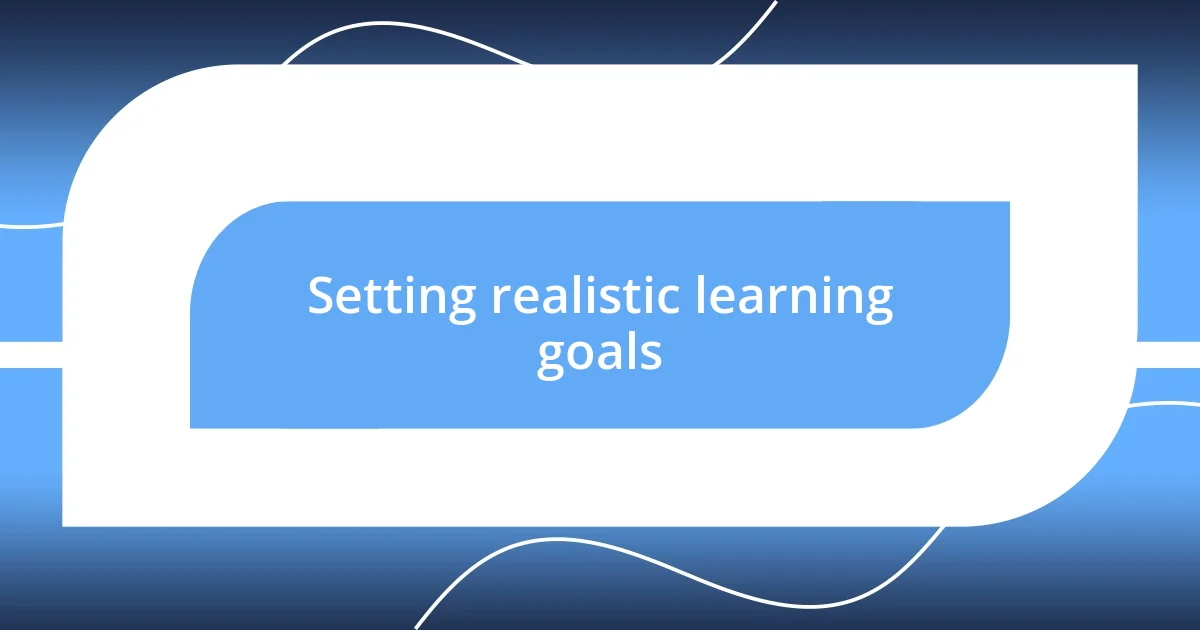
Setting realistic learning goals
Setting realistic learning goals is fundamental to my continual growth in tech. I remember when I first ventured into learning a new programming language; I aimed too high, wanting to master everything in a month. That approach only led to frustration. Instead, I shifted my focus to achievable, bite-sized goals, like mastering a handful of syntax rules each week. Have you ever felt overwhelmed by trying to learn too much too quickly?
To further illustrate, I set a goal to complete one project per month using what I learned. This strategy not only kept me motivated but also provided tangible results that I could showcase. I recall creating a simple web page that initially took me a weekend to complete, but soon enough, I was designing more complex applications. Each completed project fueled my confidence and reinforced my understanding, making the next challenge less daunting. Do you see how smaller, incremental achievements can lead to significant progress in the long run?
Moreover, I often revisit my goals to ensure they align with my evolving interests and the fast-paced tech landscape. There are times when I’ve realized that a project was too ambitious for my current skills, and it was essential to adjust—I’d pivot and select something more manageable. This flexibility has been crucial in avoiding burnout and maintaining excitement in my learning journey. Have you thought about how adaptable your learning goals are? Embracing that adaptability has been a key factor in sustaining my enthusiasm for learning.
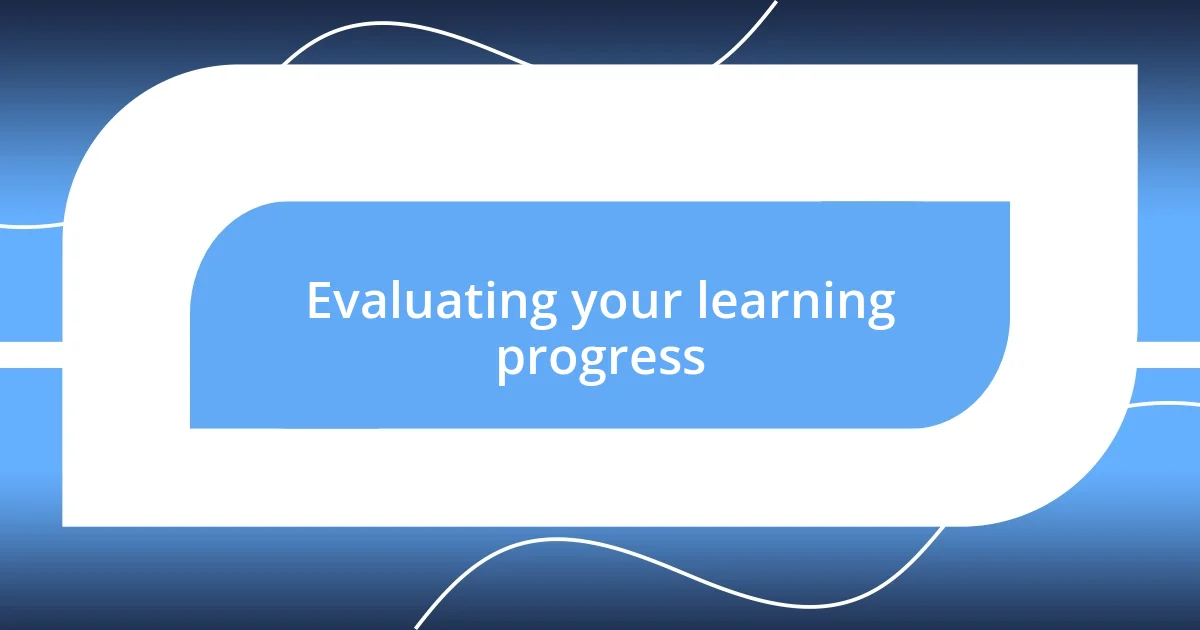
Evaluating your learning progress
Evaluating my learning progress is a reflective practice that I find invaluable. I always start by reviewing the goals I’ve set, asking myself questions like, “Have I achieved what I wanted, or are there gaps?” For instance, after working on a project, I’d sit down with my notes and the final product, thinking about where I excelled and where I stumbled. This kind of honest assessment pushes me to improve and adapt my strategies going forward.
One effective method I’ve used is maintaining a learning journal. In it, I record not just what I learn, but how I feel about my progress. Reflecting on moments of frustration, like when I struggled with a particularly tricky coding problem, helps me appreciate how far I’ve come. Have you ever taken time to jot down your thoughts on your learning experiences? Sometimes, that simple act of writing reinforces my growth in ways I might overlook in the hustle and bustle of daily learning.
Additionally, I regularly seek feedback from peers or mentors, as their insights often reveal blind spots I might not notice. I remember sharing a project with a colleague who pointed out areas for improvement I hadn’t considered. It stung at first, but their constructive criticism ended up refining my skills significantly. Engaging with others not only enhances my learning but also creates opportunities for deeper connections in the tech community. How has seeking feedback shaped your own learning experiences? I can’t emphasize enough how the perspective of others can catalyze much-needed growth.
